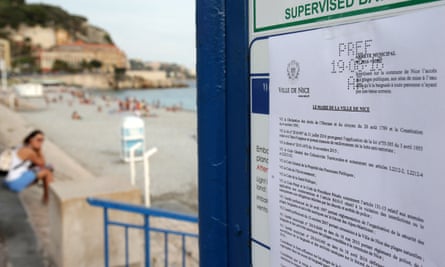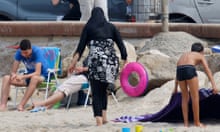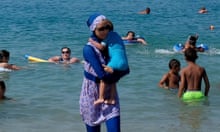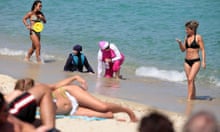Just after 8am, the sun was already beating down on Nice’s Carras beach and Dalila, a French pensioner, was treading water in the sea in her pink and purple floral burkini. “I spend a long time in the water every morning, to ease the pain from the arthritis in my hands and feet,” she said. “A dip in the sea soothes the aches and makes all the difference to my health.”
But since last week, Dalila has been trying to arrive at the beach much earlier – 6am, if she can – before the municipal police begin their patrols.
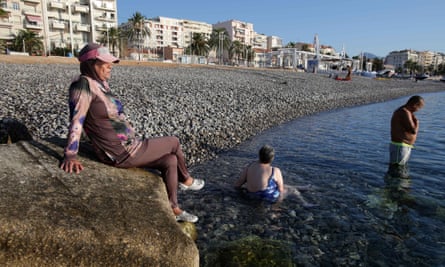
Nice, on the French Riviera, last week became the latest of around 30 coastal areas in France to ban the burkini, a full-body swimsuit, citing a risk to public order. The city is still reeling from a terrorist attack in July, in which 86 people were killed when a truck ploughed into crowds watching fireworks on Bastille Day.
Controversy over the anti-burkini decrees has intensified this week after a woman in a headscarf on a Nice beach was photographed removing her long-sleeved top surrounded by armed police. A woman in Cannes complained she was stopped by police for simply wearing a headscarf and loose, long clothing while standing on a beach.
On Friday afternoon, France’s highest administrative court suspended a burkini ban in the Côte d’Azur town of Villeneuve-Loubet. This will set a precedent for the other beach-spots, mostly on the Côte d’Azur, where local mayors had controversially issued decrees against full-body swimsuits. Those mayors will now have to decide whether to withdraw the decrees, or keep their bans in place and face further legal action from human rights groups.
The row has caused political divisions in France, with the Socialist prime minister, Manuel Valls, supporting the bans and his education minister, Najat Vallaud-Belkacem, saying they were “letting loose” racist rhetoric.
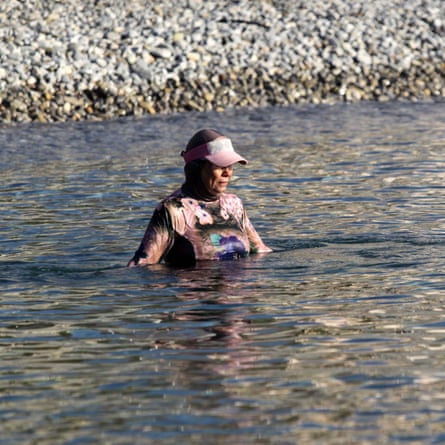
As Dalila bobbed in the clear blue sea, she stayed close to the rocks, chatting to her brother and an Italian friend as they swam nearby. Few of the couples putting up their parasols on the beach seemed to notice. Amateur fishermen cast out their lines, sunbathers changed in and out of their trunks and bikinis, and a dozen jet skis sat on the water waiting for the day’s tourist trade to begin. No one looked over. Once she had finished her swim, Dalila quickly put on her regular headscarf and a long covering that hid her burkini and walked the five minutes home.
She said a court decision suspending the ban should be seen as a victory for common sense.
“The ban and the row over burkinis make me feel very sad and it seems unfair,” she said. “We pay taxes like everyone else and I just want to do some exercise for my health on a public beach.” She bought her burkini a while ago from a shop in Nice. This week, she went to a sports shop that sells full-body wetsuits to see if she could get one as an alternative.
“Wetsuits that you’d use for diving aren’t banned and I wanted to buy one. I thought that might be an answer, but I couldn’t find one in my size,” Dalila said. “The saddest thing is that even mothers who wear headscarves have been staying away from the beach because of this. They’re staying at home instead, which is heartbreaking for the children, because there are only a few days left of the school holidays to get out and enjoy the beach. Now, many women don’t feel they can even step on to the beach wearing headscarves and long sleeves.”
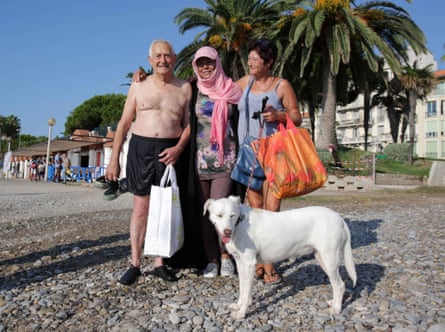
Her brother Mohamed, who works in a restaurant, had come to swim with her. He shrugged: “This is really all about the French elections coming up. It’s politics, that’s all. We should be focusing on everyone living together harmoniously in all our diversity.”
Paola Brambilla, a 53-year-old kindergarten teacher from Milan whose 83-year-old father has a holiday home in Nice and often meets Dalila on the beach, said: “It’s not right to single people out. Next year, I’ve invited them to Italy, just along the coast, where anyone can swim in whatever they like.”
The terrorist attack in Nice affected all of the city’s diverse mix of people. Those killed included local women in headscarves and Muslim children.
Michel Le Pivert, a retired driving instructor, 73, was stretching out to sunbathe just after Dalila left. He lives in an apartment nearby and comes to the beach daily from spring to autumn. “I’m here every day, but I’ve never actually seen anyone in a burkini in real life,” he said. “Only in the newspapers.” He said he was worried that politicians “making a fuss” over a “marginal issue” could prove counterproductive and alienate people.
This article includes content provided by Facebook. We ask for your permission before anything is loaded, as they may be using cookies and other technologies. To view this content, click 'Allow and continue'.
Jeanne Pêcheur, a local pensioner wearing a strapless swimsuit, had never seen anyone in a burkini either, but firmly supported the ban. “I agree wholeheartedly with the burkini bans. You can’t go into the water dressed, it’s dirty and unhygienic,” she said. “This is France, not Saudi Arabia – people must conform to what we do here. There is a lot of tension in Nice since the terrorist attack; that tension needs to be calmed. People are angry and sad, people are both crying and raging.”
But she didn’t think politicians had the answers, including Nicolas Sarkozy, who, as he seeks his party’s nomination to run again for president in 2017, has called the burkini a “provocation” and urged a nationwide ban. “Oh no, not him again,” Pêcheur said. “He did nothing when in office, so what is he going to do now?”
Thouraya, 25, an administrator in a local firm, was waiting at a nearby bus stop in a light pink headscarf. She has a young daughter and would normally take her to play on the beach every evening at around 6pm. Although she never swims, she has been afraid to even sit on the beach since the ban, fearing she would be stopped and fined for wearing a headscarf and loose, long clothing.
“I’m shocked by this ban,” she said. “France is a country of liberty and equality. This ban goes against that, and it just seems so inhuman.”
